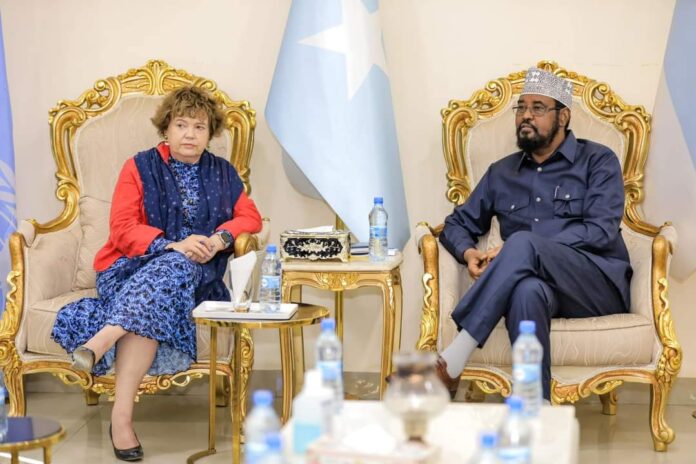Kismayo – Wrapping up her initial round of visits to Somalia’s Federal Member States, the new top United Nations official for Somalia today visited Jubaland where she met with its leadership to discuss topics including UN support, state-building, security and the humanitarian situation.
“This is the final of my Federal Member State visits as part of this tour. I will be travelling to New York shortly to [deliver] my first Security Council briefing on the 22nd of June. So, it is incredibly helpful to hear directly from the presidents of the Federal Member States to understand their priorities and what they want from the UN,” the UN Secretary-General’s Special Representative for Somalia, Catriona Laing, said.
“I recommitted the role of the UN and its good offices, as well as development programmes, in support of the people of Jubaland,” she added.
The UN Special Representative made her remarks at a joint media encounter in the city of Kismayo, alongside Jubaland’s President Ahmed Mohamed Islam ‘Madobe,’ with whom she had met earlier, along with the Federal Member State’s First Vice President Mohamud Sayid Adan.
The top UN official said the discussions were an opportunity to learn more about the security situation in Jubaland, as well as stabilisation efforts in newly-recovered areas.
“We talked firstly about security, the progress that’s been made, reclaiming areas and the really important follow-on around stabilisation. And I committed to ensuring the UN is fully behind those objectives to secure the area permanently and to come in with basic services to help people to rebuild their lives and rebuild trust with communities,” Ms. Laing said.
Discussions also touched on the humanitarian situation. According to the UN Office for the Coordination of Humanitarian Affairs (OCHA), floods caused by recent rains have severely affected various parts of the country, including the Baardheere area in Jubaland.
“We talked about the humanitarian situation, which remains very challenging here. There are particular issues around access to some parts of this state. But nevertheless, the UN is committed to try and bring life-saving support whilst we also look at longer-term solutions around climate change,” Ms. Laing said.
The floods have inundated homes and farmland, washed away livestock, temporarily closed schools and health facilities, and damaged roads. The flooding has come at a time when Somalia has been experiencing severe drought.
The UN Special Representative also discussed the Jubaland leadership’s political engagement at the state level, including with the Federal Member State’s Gedo region, and at the federal level.
“The president explained to me the role he’s been playing in the National Consultative Council and the importance of those deliberations – reaching out to the people in an inclusive consultative process, including, hopefully, Puntland, so that the country can complete its very important journey on state-building and peacebuilding, rebuilding the country for the benefit of all Somalis…I recommitted the role of the UN and its good offices, as well as development programmes, in support of the people of Jubaland,” Ms. Laing said.
While in Kismayo, the UN Special Representative also met with UN staff based there and with peacekeepers serving with the African Union Transition Mission in Somalia (ATMIS).
Soon after landing in Mogadishu two weeks ago, Ms. Laing met with Somalia’s President Hassan Sheikh Mohamud and Prime Minister Hamza Abdi Barre. She then made visits to Hirshabelle, Puntland and South West State.
Ms. Laing was appointed to her position in May of this year. Prior to her appointment in Somalia, she served in various roles in the government of the United Kingdom, and from 1993 to 1994, she served with the UN’s development arm in Somalia.






